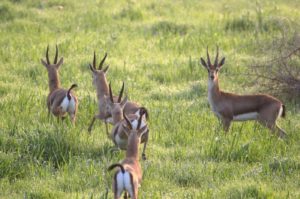But when Imad Atrash looks through the windows of his home in the occupied West Bank, he sees an unexpected silver lining.
“Birds have begun nesting on trees in my backyard for the first time,” said the executive director of the Palestine Wildlife Society in Bethlehem. “Due to home quarantine, we have begun to notice the presence of wild animals such as foxes and jackals close to residents’ homes without fear.”
After the Covid-19 outbreak in China was tied in some circles to wild animals such as bats and pangolins, Beijing imposed a “comprehensive ban” on the trade and consumption of them. The World Health Organisation has also warned against dealing with wild animals due to the potential transmission of the coronavirus or other diseases from animals to humans.
In the occupied Palestinian territories, 171 cases of Covid-19 have been officially recorded as of Friday, with at least one patient dying from the disease.
Meanwhile, government curfews have led millions to stay confined in their homes for weeks in order to slow the transmission of the virus.
But for Atrash – and other Palestinian environmental activists – the lockdowns have also provided “a blessing in disguise”, as the pandemic has led to drastic changes in people’s relationships with nature.

